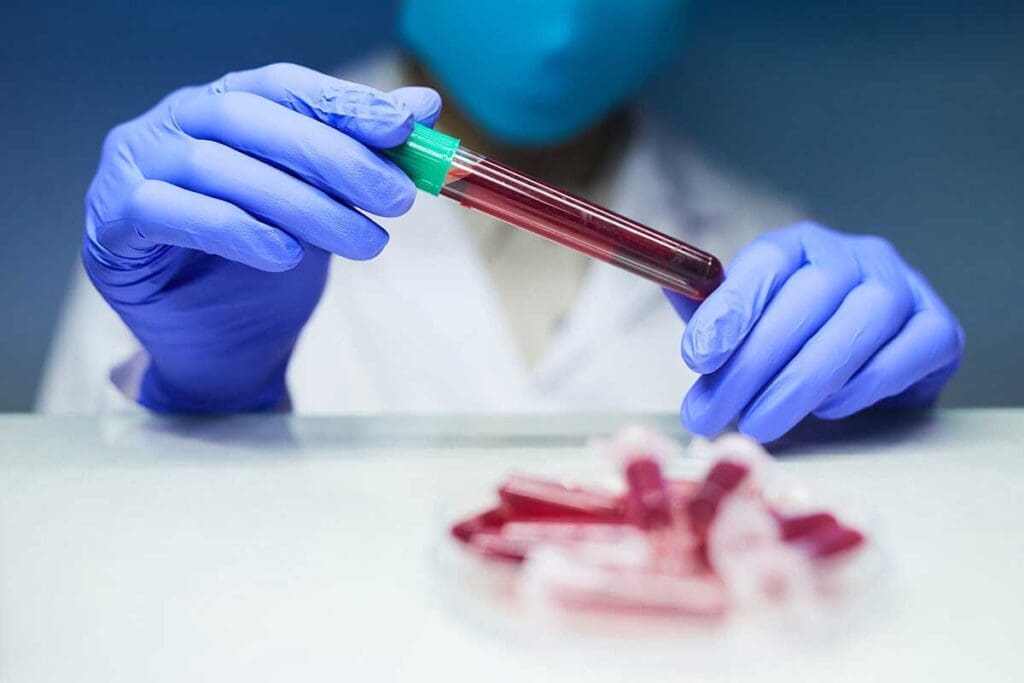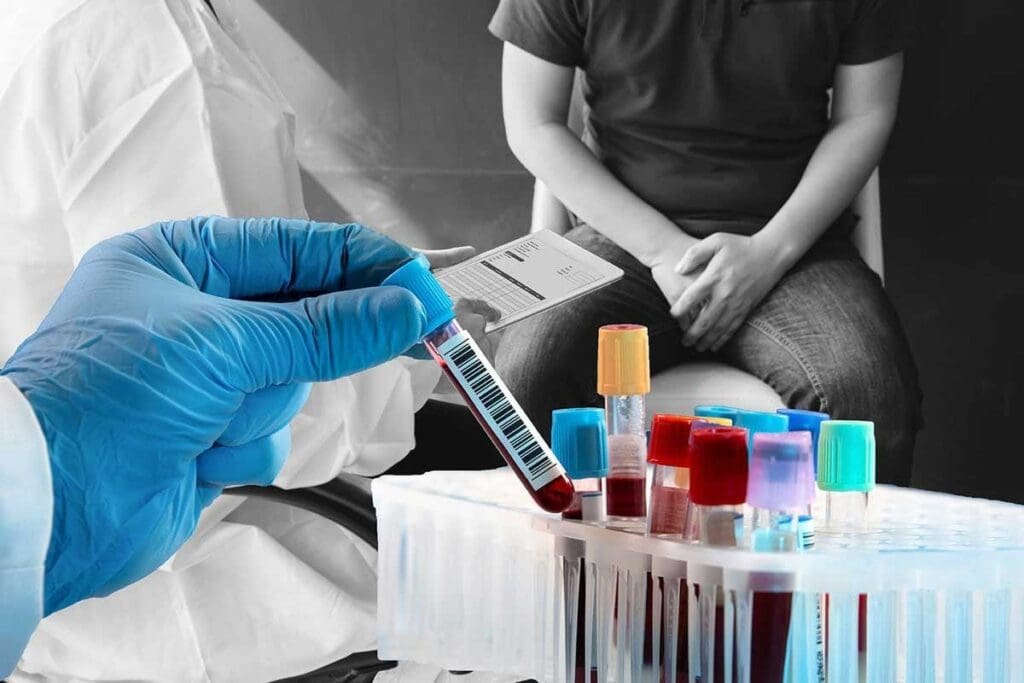
Blood cancer includes diseases like leukemia, lymphoma, and multiple myeloma. It threatens your blood cells, which give you energy, help fight infections, and prevent excessive bleeding.
Spotting the first symptoms of blood cancer can be difficult because they often look like common illnesses. At Liv Hospital, we aim to offer top-notch healthcare and help you recognize these signs early so you can get the right care quickly.
Knowing the first symptoms of blood cancer is key to getting timely treatment. Here, we’ll highlight the 10 early signs you shouldn’t ignore.
Key Takeaways
- Understanding the risks associated with blood cancer
- Recognizing the early signs of blood cancer
- The importance of seeking medical help promptly
- Liv Hospital’s commitment to patient-centered care
- Improving chances of effective treatment through early detection
Understanding Blood Cancer and Its Early Warning Signs

It’s key for both patients and doctors to know about blood cancer and its early signs. Blood cancer includes leukemia, lymphoma, and multiple myeloma. These cancers show symptoms that can be like other common illnesses.
Types of Blood Cancer: Leukemia, Lymphoma, and Multiple Myeloma
Blood cancer is split into three main types: leukemia, lymphoma, and multiple myeloma. Leukemia is a cancer of the blood and bone marrow, causing too many white blood cells. Lymphoma hits the lymphatic system, part of our immune system. Multiple myeloma is a cancer of plasma cells in the bone marrow.
Leukemia can lead to very high or very low white blood cell counts, says Houston Methodist. It also causes symptoms like fatigue, fever, and easy bruising. These signs can make it hard to spot leukemia and other blood cancers early.
Why These Cancers Are Often Misdiagnosed
Blood cancers are often mistaken because their symptoms are not unique. Symptoms like fatigue, fever, and easy bruising can mean many things, not just cancer.
- Nonspecific symptoms: Symptoms that are not unique to blood cancer.
- Similarity to other illnesses: Many symptoms of blood cancer are common to other diseases.
- Lack of awareness: Limited public awareness about the early signs of blood cancer.
Spotting these early warning signs and getting medical help quickly is vital. It helps get a correct diagnosis and a good treatment plan.
Persistent Fatigue and Weakness

Persistent fatigue and weakness are often the first signs of a problem in the body. They might mean you have blood cancer. These symptoms are hard to diagnose because they can mean many things.
Beyond Normal Tiredness: Cancer-Related Fatigue
Cancer-related fatigue is not like normal tiredness. It doesn’t get better with rest. It’s a deep exhaustion that affects your daily life. The Mayo Clinic says leukemia symptoms include persistent fatigue, weakness, and fever or chills.
Key characteristics of cancer-related fatigue include:
- Persistent tiredness that doesn’t go away with rest
- Significant weakness that interferes with daily activities
- A general feeling of being unwell
How Blood Cancer Affects Energy Levels
Blood cancer can lower your energy in several ways. One main reason is anemia, a lack of red blood cells or hemoglobin. This makes it hard for your body to get oxygen, causing weakness and fatigue.
Also, blood cancer can change your body’s metabolic rate, making you feel more tired. It can cause inflammation and release cytokines, proteins that make you feel fatigued and have flu-like symptoms.
Understanding the link between blood cancer and fatigue is key for early detection and treatment. Recognizing persistent fatigue as a sign of blood cancer can help you get medical help sooner. This could improve your chances of recovery.
Unexplained Weight Loss
Losing weight without trying can be a sign of a serious health issue, like blood cancer. This symptom needs attention because it can point to different cancers, including leukemia and lymphoma.
The Metabolic Impact of Blood Cancer
Blood cancer can change how your body uses energy. Cancer cells use a lot of energy, making your body’s metabolism go up. This can cause weight loss, even if you’re eating the same amount.
The metabolic impact of blood cancer is a key factor in unexplained weight loss.
The Mayo Clinic says losing weight without trying is a common sign of leukemia. This weight loss happens because cancer cells mess with your body’s normal energy use.
Significant Weight Loss Without Trying
Significant weight loss without trying is a warning sign. If you’re losing weight without trying, see a doctor right away. Early detection and diagnosis are key to managing blood cancer.
When looking at unexplained weight loss, consider a few things:
- The rate of weight loss: Losing weight quickly is more worrying than losing it slowly.
- Changes in appetite: A change in how much you want to eat can be linked to weight loss.
- Other symptoms: Having symptoms like fatigue, fever, or night sweats along with weight loss.
Knowing why you’re losing weight without trying can help find blood cancer early. If you’re losing a lot of weight without a reason, get medical help.
Frequent Infections and Slow Recovery
Recurring infections or slow recovery times might mean blood cancer is affecting your immune system. If your body can’t fight off infections, it could be a sign of a serious issue.
Immune Function Compromise
Blood cancer can weaken the immune system, making it hard to fight infections. says blood cancer can risk essential functions like fighting off infections. This weakens the immune system, leading to frequent infections and slow recovery.
People with blood cancer often get sick more often. Their immune system can’t keep up with fighting infections. This is worrying if the infections are severe or need long treatment.
Patterns of Recurring Illness
Seeing the same illness over and over could mean blood cancer. Some common signs include:
- Frequent bouts of pneumonia or bronchitis
- Recurring sinus or ear infections
- Prolonged recovery times from common infections
- Recurring fevers without an apparent cause
These signs suggest a weakened immune system, possibly due to blood cancer. If you notice these, see a doctor quickly. Early detection can greatly improve treatment results.
Doctors say early diagnosis and treatment of blood cancer can greatly improve outcomes. This shows how important it is to know the signs and seek medical help fast.
“The key to managing blood cancer effectively lies in early detection and appropriate treatment strategies.”
| Symptom | Description | Potential Indicator |
| Frequent Infections | Recurring bouts of infections | Compromised immune function |
| Slow Recovery | Prolonged recovery times | Impaired immune response |
| Recurring Fevers | Unexplained fevers | Potential sign of blood cancer |
Knowing these signs and taking care of your health can help a lot. If you have signs of a blood cancer like frequent infections or slow recovery, see a doctor.
Easy Bruising and Unusual Bleeding
Blood cancer can show itself in many ways, like easy bruising and unusual bleeding. These signs often come from problems with platelets. We’ll look at how blood cancer affects platelets and how to spot unusual bleeding.
The Connection Between Blood Cancer and Platelet Function
Platelets are key for stopping bleeding when we get hurt. But, blood cancer, like leukemia, can mess with platelet production. Houston Methodist says leukemia can cause easy bruising because of low platelet counts.
When platelet counts drop, it’s hard for the body to clot. This leads to easy bruising and bleeding that won’t stop.
The link between blood cancer and platelets is complex. Blood cancer can fill up the bone marrow, where platelets are made. This can lower platelet counts. Also, some blood cancer treatments can make platelet production worse.
Recognizing Abnormal Bleeding Patterns
Knowing the signs of abnormal bleeding is important. Look out for:
- Frequent or severe nosebleeds that are hard to stop.
- Bleeding gums or bleeding that keeps going after dental work.
- Easy bruising without any reason or injury.
- Petechiae (small spots on the skin that occur with bleeding).
- Prolonged bleeding after small cuts or injuries.
If you see these signs, see a doctor right away. These symptoms don’t always mean you have blood cancer. But, they can show there’s a problem that needs to be checked.
Knowing the signs of blood cancer, like easy bruising and unusual bleeding, can help find and treat it early. If you’re experiencing these symptoms, get checked by a doctor. This can help figure out what’s going on and what to do next.
Night Sweats and Unexplained Fever
Night sweats and fevers without a clear cause can be serious. They might be early signs of blood cancer. These symptoms happen because the body is fighting the disease.
The Body’s Inflammatory Response to Blood Cancer
Blood cancer can make the body’s temperature rise. This is because cancer cells release substances that heat up the body. The body tries to fight the disease, but it can also show the disease is getting worse.
The Mayo Clinic says fever or chills are common in leukemia, a blood cancer. This shows the body’s immune system is fighting the cancer cells, causing the temperature to go up.
Characteristics of Cancer-Related Fevers
Cancer-related fevers are different. They can happen at any time, not just at night. Night sweats, linked to fever, can be very severe. They can disrupt sleep and cause discomfort.
| Symptom | Description | Relation to Blood Cancer |
| Night Sweats | Severe sweating at night, often associated with fever | Can be a sign of the body’s response to cancer cells |
| Unexplained Fever | Elevated body temperature without an apparent infection | May indicate the presence of cancer cells triggering an inflammatory response |
| Recurring Fevers | Fevers that recur over time | Can be associated with the progression of blood cancer |
It’s important to know these symptoms could mean blood cancer. If you or someone you know has persistent night sweats or unexplained fevers, see a doctor. They can check and figure out what’s going on.
First Symptoms of Blood Cancer: Swollen Lymph Nodes
One of the first signs of blood cancer is swollen lymph nodes. This symptom is often missed. Swollen lymph nodes can signal blood cancer, a disease affecting millions globally. We’ll look into why this happens and its importance for early detection.
Why Lymph Nodes Enlarge in Blood Cancers
Lymph nodes are part of the body’s defense against infection and disease. In blood cancers like lymphoma or leukemia, they swell with cancer cells. This swelling is usually painless, making it a subtle but important symptom.
Research shows swollen lymph nodes are common in kids with leukemia. Cancer cells in lymph nodes cause them to swell, showing the disease’s progress. Knowing this helps in early diagnosis and treatment.
Key Areas to Check for Lymph Node Swelling
It’s important to know where lymph nodes are, like in the neck, armpits, and groin. Regular checks in these areas can spot unusual swelling. Being alert to changes is key for better treatment outcomes.
- Neck: Swollen lymph nodes in the neck can be a sign of lymphoma or leukemia.
- Armpits: Enlarged lymph nodes here can indicate the spread of cancer.
- Groin: Swelling in this area can also be a symptom of blood cancer.
Spotting swollen lymph nodes is vital for early blood cancer detection. If you see unusual swelling, see a doctor right away. We aim to offer full care and support for blood cancer patients.
Shortness of Breath and Chest Discomfort
Shortness of breath is a key symptom of blood cancer. It shows a problem with oxygen transport in the body. Blood cancer can harm the production of healthy red blood cells. These cells are vital for carrying oxygen to the body’s parts.
says blood cancer can lower healthy red blood cell production. This can cause shortness of breath. This symptom is worrying because it might mean anemia or other blood cancer problems.
How Blood Cancer Affects Oxygen Transport
Blood cancer can mess up red blood cell production. This leads to less oxygen being carried to the body’s tissues. You might feel tired, weak, and have shortness of breath.
The effect on oxygen transport is big. The body’s tissues and organs need oxygen to work right. Without enough oxygen, you can feel short of breath.
“Anemia is a common complication of blood cancer, characterized by a lack of healthy red blood cells. This condition can lead to shortness of breath, as the body’s tissues do not receive enough oxygen.”
Respiratory Symptoms Even at Rest
Shortness of breath from blood cancer can happen even when you’re resting. This is different from normal breathlessness after exercise.
Feeling respiratory symptoms without an apparent cause is scary. If these symptoms last, see a doctor. They can find the cause and treat it.
Knowing the signs of blood cancer, like shortness of breath and chest discomfort, is key. If you have these symptoms, get medical help right away.
Bone and Joint Pain
Bone and joint pain can be a sign of blood cancer, not just arthritis or injury. The Mayo Clinic says bone pain or tenderness is a symptom of leukemia, a blood cancer type. We’ll look into how bone and joint pain is linked to blood cancer, including the reasons and common signs of this pain.
The Mechanism of Cancer-Related Bone Pain
Bone pain from blood cancer happens when cancer cells build up in the bone marrow. This buildup can damage or erode bones, causing pain. The pain comes from cancer cells taking over normal bone marrow cells, leading to bone destruction.
“Cancer cells in the bone marrow cause pain by releasing chemicals that activate pain receptors,” a study on cancer-related bone pain explains. This shows why it’s key to understand the connection between bone pain and blood cancer.
Common Locations and Characteristics
Blood cancer-related bone and joint pain can show up in different body parts. This includes the long bones of the arms and legs, hips, and spine. The pain can last a long time and get worse if not treated. It’s important to tell the difference between regular muscle pain and pain that might be a sign of blood cancer.
The pain from cancer can feel sharp, dull, constant, or come and go. Knowing the patterns and types of bone pain is vital for catching and treating blood cancer early.
We stress the need to know the signs of blood cancer, like bone and joint pain. If you have ongoing or severe bone pain, see a doctor to find out why and get the right treatment.
Abdominal Discomfort and Enlarged Organs
In advanced blood cancer, patients may feel abdominal discomfort. This is often due to organs in the abdomen getting bigger. The cancer can affect many organs in this area.
Organ Involvement in Advanced Blood Cancer
Advanced blood cancer can make organs like the liver and spleen swell. This happens when cancer cells build up in these organs. The Mayo Clinic says swollen lymph nodes, an enlarged liver, or spleen can be signs of leukemia.
The liver and spleen play key roles in our body. They help filter blood and store red blood cells. When they get bigger, it can cause pain and discomfort in the belly. For more on leukemia symptoms, check out this resource.
Signs of Liver and Spleen Enlargement
Signs of a big liver can include pain or discomfort in the upper right belly. A big spleen can cause pain or a feeling of being full in the upper left belly. These symptoms can also be linked to feeling tired and losing weight.
| Organ | Symptoms of Enlargement | Possible Causes |
| Liver | Discomfort or pain in the upper right abdomen | Cancer cell accumulation |
| Spleen | Pain or feeling of fullness in the upper left abdomen | Cancer cell accumulation |
Conclusion: Taking Action When You Notice Symptoms
Spotting the early signs of blood cancer is key to getting timely help. We’ve talked about symptoms like constant tiredness, unexpected weight loss, and frequent infections. If you see these signs, it’s important to act fast to find out why.
Symptoms of blood cancer can be tricky because they can look like other health issues. But if you keep feeling sick or notice something off, see a doctor. says early detection is critical for better treatment.
Knowing the signs of blood cancer and its symptoms can lead you to see a doctor. We urge you to take action if you or someone you care about is showing these signs. Quick action and the right care can greatly improve treatment outcomes.
FAQ
What are the main types of blood cancer?
The main types of blood cancer are leukemia, lymphoma, and multiple myeloma. These cancers affect different parts of the blood and immune system. They lead to various symptoms.
How do I know if I have blood cancer?
Blood cancer can be hard to spot early because its symptoms are like common illnesses. Look out for persistent or severe symptoms like fatigue, unexplained weight loss, and frequent infections. If you notice these, see a doctor.
What are the early signs of blood cancer?
Early signs include persistent fatigue, unexplained weight loss, and frequent infections. You might also notice easy bruising, night sweats, swollen lymph nodes, and shortness of breath. If you see these, get checked by a doctor.
Why are blood cancers often misdiagnosed?
Blood cancers are often misdiagnosed because their symptoms are not specific. They can be like other illnesses. This is why it’s key to get medical help for any persistent or concerning symptoms.
How does blood cancer affect energy levels?
Blood cancer can lead to anemia, which means fewer red blood cells. This makes it hard for the body to get oxygen. As a result, you might feel tired and weak, even after resting.
What is cancer-related fatigue?
Cancer-related fatigue is a deep, lasting tiredness that doesn’t go away with rest. It’s a common symptom of blood cancer. It happens because the body is fighting the cancer and its treatment.
Can blood cancer cause weight loss?
Yes, blood cancer can cause unexplained weight loss. It affects how the body uses nutrients. Losing a lot of weight without trying is a sign that needs medical attention.
How does blood cancer compromise immune function?
Blood cancer can weaken the immune system. It does this by affecting white blood cells, which fight infections. This can make you get sick more often and take longer to get better.
What is the connection between blood cancer and platelet function?
Blood cancer can mess with platelet production and function. This leads to easy bruising and unusual bleeding. Platelets are key for blood to clot, and problems with them can cause bleeding issues.
How can I recognize abnormal bleeding patterns?
Look out for frequent or heavy nosebleeds, bleeding gums, easy bruising, and prolonged bleeding after injuries or cuts. If you notice these, talk to a healthcare professional.
Can blood cancer cause night sweats and fever?
Yes, blood cancer can cause night sweats and unexplained fever. These are signs of the body’s fight against the cancer. They can point to lymphoma or other blood cancers.
Why do lymph nodes enlarge in blood cancers?
Lymph nodes can swell in blood cancers, like lymphoma. This is because cancer cells build up in these nodes. Checking for swollen lymph nodes is important for spotting blood cancer.
How does blood cancer affect oxygen transport?
Blood cancer can lead to anemia, which means fewer red blood cells. This makes it hard for the body to get oxygen. You might feel short of breath and have chest discomfort, even when resting.
What is the mechanism of cancer-related bone pain?
Cancer-related bone pain happens when cancer cells invade the bone or cause bone destruction. This pain can occur in the back, ribs, and hips. Multiple myeloma and leukemia are common causes.
Can blood cancer cause abdominal discomfort?
Yes, advanced blood cancer can cause abdominal discomfort and enlarged organs like the liver and spleen. This can lead to pain or discomfort in the abdomen.
What are the signs of liver and spleen enlargement?
Signs include abdominal pain or discomfort, feeling full quickly when eating, and a palpable mass in the abdomen. These symptoms can indicate advanced blood cancer and need medical evaluation.
References
National Health Service. (2023, April 17). Symptoms of Non-Hodgkin lymphoma. nhs.uk.https://www.nhs.uk/conditions/non-hodgkin-lymphoma/symptoms/
Boddu, P., & Zehnder, J. L. (2024). Acute Myeloid Leukemia. In StatPearls. StatPearls Publishing.https://www.ncbi.nlm.nih.gov/books/NBK493175/

































